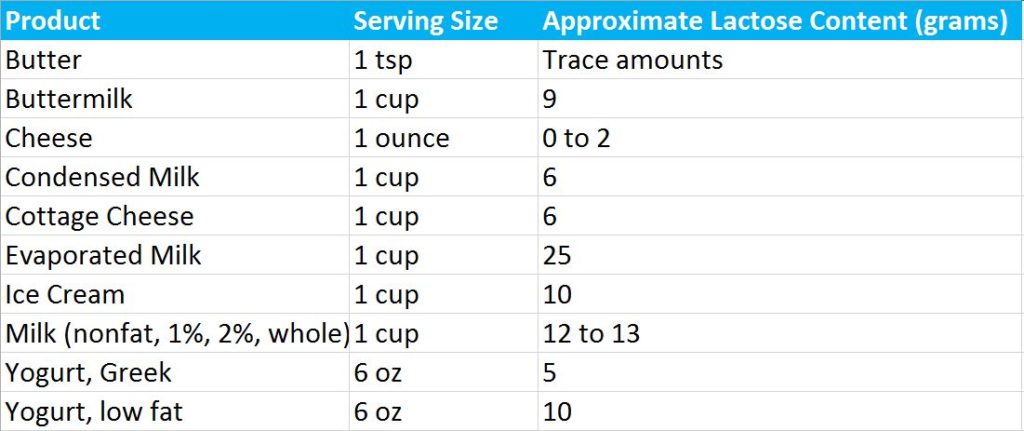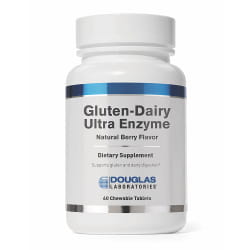Do you ever get diarrhea, upset stomach, or occasional headaches after eating? These feelings may be from foods you eat that your body is sensitive to and just doesn’t digest properly.
It’s generally good to be tolerant, but you don’t have to put up with food intolerance. If you are tired of unwanted recurring symptoms, there are natural remedies available that can help.
What is food intolerance and how is it different than a food allergy?
A food intolerance is a gastrointestinal response that occurs when the body is unable to digest a protein, fat, or carbohydrate properly. Although they are commonly confused, a food intolerance is very different from a food allergy. A food intolerance is usually the inability of the digestive system to absorb the molecules in a particular food. A food allergy is an immune response to a molecule within the food that the body absorbs and mistakenly identifies as something harmful (usually a protein), and a small exposure can be severe or life-threatening and require a call to 9-1-1 — rather than just a mild-to-moderate nuisance.
What causes food intolerance?
Enzymes and bacteria are needed to fully digest foods. Without the needed enzymes, proper digestion does not happen. This inability to digest foods, most commonly lactose or gluten, leads to undesirable symptoms — like gas, cramping, and headaches, just to name a few. Such side effects usually stem from the pancreas, intestinal cells, and other organs not making necessary enzymes.
In addition to the common lactose and gluten intolerances, specific chemicals or hidden ingredients in processed foods such as monosodium glutamate (MSG) or the preservative butylated hydroxytoluene (BHT) are difficult to digest for some people, but have no effect for others.
Salicylates, which occur naturally in fruits, vegetables and spices to defend against insects, can cause issues for some people when they eat plant-sourced foods. Synthetic salicylates can be found in toothpaste, aspirin, ibuprofen and Pepto Bismol. Some people have an intolerance to caffeine, commonly found in coffee, tea, and chocolate. Many are also susceptible to adverse reactions when consuming red wine, black tea, black coffee and dark chocolate due to the tannins these products contain. Lastly, “FODMAPs” are certain types of carbohydrates that are commonly found in foods and frequently cause food intolerance symptoms, yet they are often overlooked when attempting to diagnose the problem.
How do I know which foods trigger my intolerance?
There a few ways to begin determining food intolerances; depending on how intensive of a process a person is willing to go through. Some people gradually learn by trial and error. For example, if every time you eat bread, you experience bloating, you learn to avoid bread because you know it makes your belly feel swollen and full of gas. Many just cut the most common culprits, lactose and gluten, out of their diet. This step alone often brings relief to many people. For a more comprehensive approach, consider an elimination diet – which removes a broad selection of foods (like deep fried foods, alcohol, caffeine, processed foods, simple sugars, as well as gluten and lactose) that are believed to cause digestional discomfort. Remove these foods for a minimum of two weeks or until symptoms subside. Reintroduce one suspected food item at a time and monitor the response over a 3-day period — as a reaction can take this long to develop. If the food doesn’t cause the symptoms to return, then keep it in the diet. As a last resort, some doctors may recommend a skin prick or blood test in an attempt to identify food allergies or sensitivities; however, the validity of these tests is uncertain.
What does the science say about addressing food intolerances?
Lactose
Some may know that lactose is a sugar found in milk and other dairy products, but many are unaware of the great difference in lactose content between various milk-based foods. For instance, a cup of milk has over 100 times more lactose than an ounce of cheese. The longer the cheese is aged, the less lactose remains. Yogurts vary greatly in their lactose content. Full fat yogurts and strained yogurts like Greek-style yogurt have less whey than low fat yogurts and, since lactose is found in the whey, they have less lactose. Whey protein is often found in protein drinks, and they also contain some lactose. Whey isolate will have less lactose than those protein drinks containing whey concentrate or whey hydrolysate. Look for a whey protein with little or no sugar on the label, because that sugar is likely lactose. See the table below that shows the lactose content of dairy products:

People with lactose intolerance most commonly experience symptoms such as stomach pain, bloating, diarrhea and increased gas. While yogurt is high in lactose, research from Nutrients explains when the probiotic strains lactobacilli (especially L. bulgaricus) and bifidobacteria are included in yogurt, they help break down lactose and lead to less gas and abdominal pain. Finding a yogurt that includes those specific strains may help, but make sure it has “live and active” cultures.
Generally, yogurts contain 4 different strains and the label will identify the probiotics present – some even carry the National Yogurt Association’s seal. However, to be considered a probiotic yogurt, it must have 1 billion CFU (colony forming units) – which is not considered to be a dose large enough to counteract the lactose and make a noticeable difference with symptoms. Depending on the type of probiotic strain, a therapeutic dose can typically range anywhere from 3 to 50 billion CFU’s per dose for the average adult. Since the probiotics in the yogurt with your breakfast in the morning likely won’t provide the dose you need to properly digest the lactose in that yogurt, using a natural supplement such as SymBiotics with FOS Powder, by Allergy Research Group, can help.
According to a study in Journal of Clinical Gastroenterology, a lactase enzyme tablet derived from Aspergillus fungus can also reduce bloating and gas in people who don’t process lactose well. The researchers found a decrease in symptoms when lactase was given just before the ingestion of lactose (milk products). Those looking to possibly replicate this study’s results should consider a similar digestive enzyme supplement derived from Aspergillus fungus – like Douglas Laboratories’ lactase tablet, Gluten-Dairy Ultra Enzyme.
Gluten
Those who are intolerant of gluten (a protein found in cereal grains like wheat, barley, spelt, rye and triticale) often feel bloated when they eat it and can also experience headaches, diarrhea, skin rashes, and tiredness. While it is obvious that gluten is found in bread and crackers, it is less obviously found in beer, dressings, sauces (including soy sauce), couscous, French fries, and ice cream, too. Not knowing what food gluten is in, makes it difficult for people with gluten intolerances to avoid. A study published in Scientific Reports found that taking prolyl endoprotease, a naturally-occurring enzyme formed by amino acids, before consuming gluten helped gluten-sensitive individuals digest gluten when compared to those who took a placebo instead. Gluten Manager, by Integrative Therapeutics, utilizes the power of this enzyme to help gluten-intolerant people with unintended exposure to gluten.
Those with gluten intolerance should try to adhere to a gluten-free diet as much as possible. With a gluten-free diet, research from Clinical Nutrition warns that individuals may be low in fiber and certain vitamins and minerals such as vitamin D, vitamin B12, folate, iron, zinc, magnesium and calcium – so consider taking a multivitamin that contains all these such as Basic Nutrients IV with Copper and Iron.
In addition to gluten intolerance, which is also called non-celiac gluten sensitivity, there are other gluten-related conditions to be aware of including celiac disease and wheat allergies. Although celiac disease has similar symptoms to gluten intolerance, it is a greater form of gluten intolerance. Celiac disease is a serious immune response that can cause inflammation and damage to the small intestine from eating gluten. Most people with celiac experience diarrhea, but it can also lead to malnutrition, anemia, rash and depression. A wheat allergy is an exaggerated or abnormal immune response to at least one of the proteins contained in wheat. Common symptoms can include hives, breathing difficulties such as wheezing, nausea, or a bloated stomach. Even breathing in the dust of wheat flour when cooking can trigger a response. In severe cases, a wheat allergy can be life threatening.
Caffeine
Those with caffeine intolerance (sometimes called caffeine hypersensitivity) are overly sensitive to its effects – leading to symptoms like insomnia, racing heartbeat, nervousness or anxiety, and headaches. Most adults can safely consume up to 400 mg of caffeine, or about four cups of coffee daily. But some, linked to their genetics, have a decreased ability to metabolize caffeine and are hypersensitive to it. Those with an intolerance to caffeine might consider trading caffeinated coffee for decaf (which has less caffeine), non-caffeinated tea, or another similar beverage with little to no caffeine.
One such substitute, that is a hot drink and good for you, is Golden Fusion by Metagenics. This hot drink alternative to coffee or tea includes a wonderfully-sipped warm mix of turmeric and dairy-free milk along with a pinch of other spices like pepper and cinnamon. With its highly-absorbable curcumin and organic ginger, it is a tasty, rich, creamy, naturally-healthy alternative.
Salicylates
Salicylate-intolerant individuals often report stomach pain, ringing in the ears, itchy skin and swelling in the hands, feet, eyelids, or lips when exposed to them. Salicylates are a group of chemicals found in both synthetically-produced products, like certain toothpastes or aspirin, as well as plants. Avoiding all plant-based foods is obviously not healthy, but steering clear of foods with particularly high levels of salicylates (mint flavoring, tomato sauce, berries, and citrus fruits – especially those that are dried) will help minimize the symptoms of this intolerance. Consider also that salicylates are in toothpaste, chewing gum, mints, and other similar products. There are often alternatives that are explicitly salicylate-free.
Tannins
Tannins are certain chemical compounds that are commonly found in various plants like cranberry, walnut, oak, tea, rhubarb, nuts, cacao and grapes. People are often most aware of their presence in wine. People who are intolerant to tannins experience unwanted headaches and migraines, upset stomach, or bowel irritation. The only way to avoid tannin intolerance-related symptoms is to avoid foods and drinks with high tannin content; namely dark chocolate, red wine, tea, coffee, walnuts, almonds and other whole nuts with skins, spices like cinnamon and clove, pomegranates, and red beans. Tannins can also adversely affect the body’s ability to absorb iron and should be avoided or reduced if experiencing any type of iron deficiency.
FODMAPs
FODMAPs are types of carbohydrates found in many different foods, including some of the foods already referenced. These carbohydrates include simple sugars found in many fruits and vegetables (fructose) or table sugar. Lactose is a FODMAP, so while someone may think they are lactose intolerant, their symptoms may not subside completely with a lactose-free elimination diet because they are FODMAP intolerant. Many grains – such as wheat, spelt, rye, and barley are also FODMAPs, so someone with a gluten intolerance may be FODMAP intolerant. FODMAPs include many legumes (beans) as well as sugar alcohols like sorbitol or xylitol, which are often used in sweeteners.
FODMAP stands for “fermentable oligo-, di-, mon-saccharides and polyols.” These terms are the scientific names that classify various groups of carbs that are known for causing unwanted digestive symptoms like gas, bloating, and intestinal upset. This is because FODMAP foods pass all the way through digestion, instead of being absorbed, and reach the colon where they become fermented by bacteria. This fermenting causes gas and bloating; often of hydrogen sulfide which is a rotten egg smell. FODMAP-containing foods include apples, cherries, peaches, milk, wheat, barley, rye, garlic, onion, broccoli, cabbage, kidney beans, lentils, soybeans, and many others.
Food additives
There are countless numbers of substances that are added to common foods to alter their color, flavor, and help preserve them. Additives are usually just a small part of any packaged food, and the number of additives known to cause problems for people is relatively small, but they can still cause big issues for some. Some of the most common additives that cause problems include food dyes like tartrazine (also known as “yellow #5”), the preservative butylated hydroxytoluene (BHT), and monosodium glutamate (MSG). MSG is known to cause headaches, flushing, sweating, and numbness/tingling. Additives like yellow #5 can lead to anxiety, sleep disturbances, and migraines. Although it is somewhat uncommon, people who are sensitive to BHT can develop chronic hives and other skin reactions. The best solution for those with intolerances to food additives is to simply avoid processed foods and eat healthy, whole foods instead.
Anything else worth trying?
Some people find that exposing themselves to small amounts of food to which they have a known intolerance doesn’t cause symptoms. Some even suggest that it may help them overcome their intolerance – but the science behind this practice is inconclusive. Similarly, some say that taking a break from the offending food for an amount of time may help the body digest it better when the food is reintroduced. Also consider eating a diet rich in foods that contain natural digestive enzymes. For instance, pineapples contain bromelain and proteases (to digest protein), mangoes have amylase (to break down carbs), honey has diastases (to digest starch into sugar) and invertases (for digesting carbs), and avocados have lipase (to break down fat).
I hope this information helps you avoid, or at least reduce, the uncomfortable effects of food intolerances. If you have any questions regarding the concepts discussed here or anything else, you can reach our customer service team at 888-460-3091 or e-mail them at: customerservice@oakwaynaturals.com.
Until next time, stay healthy!
Yours in health,
Dr. Gregg Gittins












Comments are closed.